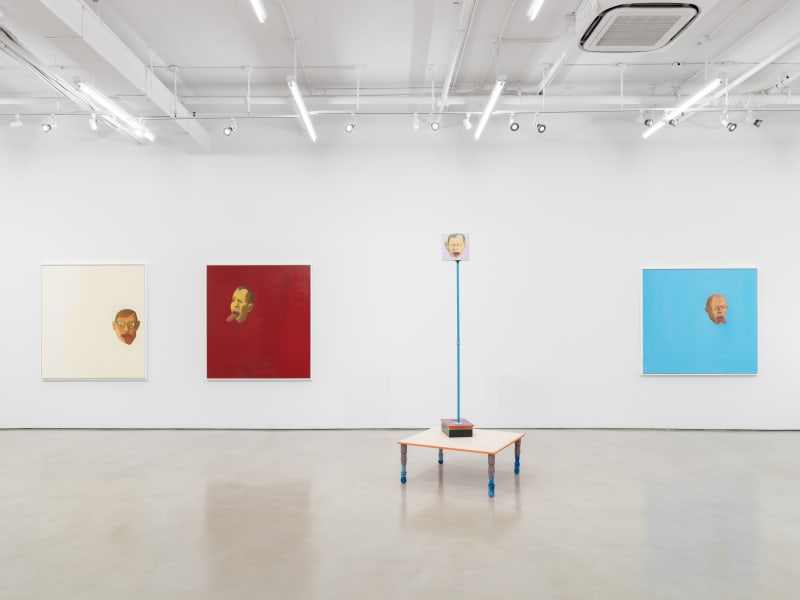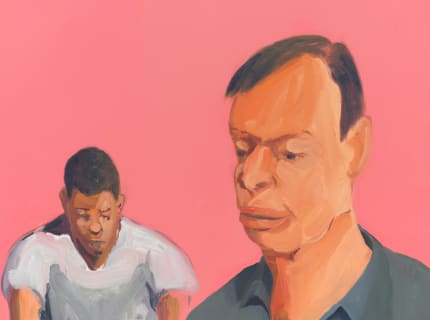Steve Locke: your blues ain’t like mine
Alexander Gray Associates, New York presented Steve Locke: your blues ain’t like mine, the artist’s first one-person exhibition in Chelsea. Featuring recent figurative paintings and sculptures, your blues ain’t like mine takes its title from Bebe Moore Campbell’s landmark novel of the same name. Like Campbell’s 1992 text, Locke’s exhibition delineates the complicated relationships between identity, power, desire, and violence.
Locke’s cruisers depict intimate moments between men to better map the connection between identity and desire. Employing a sense of color the artist refined in parallel with his abstract Homage to the Auction Block paintings (2019–present), recent cruisers emerge as meditations on the power of the gaze. Imbuing a sideways glance with eagerness, uncertainty, and risk, Locke explains these works represent “… possibility … [and] an acknowledgment of beauty.” Further challenging reductive understandings of desire, Locke’s Tongue Paintings refute traditional representations of masculinity through their open mouth imagery. The series’s floating heads and extended tongues lay the foundation for a subversive model of male portraiture that resists the trappings of triumphalism to instead foreground pathos and vulnerability.
This vulnerability reflects Locke’s own experiences as a queer Black man. Forced to negotiate a world shaped by racism and homophobia, his free-standing works signpost the cost of this navigation, incorporating materials and motifs that reference his biography into their construction. His sculptures’ uncanny, human-like physicality engages viewers in an extended confrontation, implicating them in the rising global tide of polarization and hate. “It’s work that’s addressing you,” the artist summarizes. “And it’s something that’s accusing you at the same time.”
At once seductive and incriminating, Locke’s work critically reflects on contemporary society. His colorful paintings pulse with an unsettling charge that sheds light on the histories of Blackness and queerness. “The biggest lie in the current moment is that we cannot understand what someone else is going through. Our blues are intertwined,” Locke concludes. “If you can see white supremacy and fascism in your own home and think that has nothing to do with you … your blues ain’t like mine.”
Steve Locke’s work has been the subject of numerous one-person exhibitions, including in the name of love, the Gallatin Galleries, New York University, NY (2019); Three Deliberate Grays for Freddie (A Memorial for Freddie Gray), curated by Pieranna Cavalchini, the Isabella Stewart Gardner Museum, Boston, MA (2018); Love Letter to a Library, the Boston Public Library, MA (2018); The School of Love, Bard College at Simon’s Rock, Great Barrington, MA (2018); and there is no one left to blame, curated by Helen Molesworth, the Museum of Contemporary Art, Boston, MA (2013), traveled to the Museum of Contemporary Art Detroit, MI (2014). He has also participated in a multitude of group exhibitions, including Feedback, curated by Helen Molesworth, The School, Jack Shainman Gallery, Kinderhook, NY (2021); The BIG Picture: Giant Photographs and Powerful Portfolios, the Fitchburg Art Museum, MA (2020); Recruiting for Utopia: Print and the Imagination, the Fruitlands Museum, Harvard, MA (2020); and Coded, curated by Alexandria Smith, the Mills Gallery, the Boston Center for the Arts, MA (2018). Locke’s work is in the collections of the Black Mountain College Museum + Arts Center, Asheville, NC; the Brooklyn Academy of Music, NY; the Colby College Museum of Art, Waterville, ME; the Cornell Fine Arts Museum, Rollins College, Winter Park, FL; the Institute of Contemporary Art Boston, MA; the Mead Art Museum, Amherst College, MA; the Museum of Fine Arts, Boston, MA; the Peabody Essex Museum, Salem, MA; and the Tufts University Art Galleries, Medford, MA. He is the recipient of many grants and awards, including the Rappaport Prize from the deCordova Sculpture Park and Museum (2022); the Guggenheim Fellowship from the John Simon Guggenheim Memorial Foundation (2020); the Pollock-Krasner Foundation Grant (2014); the LEF Contemporary Work Fund Grant (2009); and the Art Matters Foundation Award (2007).
Alexander Gray Associates, New York presented Steve Locke: your blues ain’t like mine, the artist’s first one-person exhibition in Chelsea. Featuring recent figurative paintings and sculptures, your blues ain’t like mine takes its title from Bebe Moore Campbell’s landmark novel of the same name. Like Campbell’s 1992 text, Locke’s exhibition delineates the complicated relationships between identity, power, desire, and violence.
Locke’s cruisers depict intimate moments between men to better map the connection between identity and desire. Employing a sense of color the artist refined in parallel with his abstract Homage to the Auction Block paintings (2019–present), recent cruisers emerge as meditations on the power of the gaze. Imbuing a sideways glance with eagerness, uncertainty, and risk, Locke explains these works represent “… possibility … [and] an acknowledgment of beauty.” Further challenging reductive understandings of desire, Locke’s Tongue Paintings refute traditional representations of masculinity through their open mouth imagery. The series’s floating heads and extended tongues lay the foundation for a subversive model of male portraiture that resists the trappings of triumphalism to instead foreground pathos and vulnerability.
This vulnerability reflects Locke’s own experiences as a queer Black man. Forced to negotiate a world shaped by racism and homophobia, his free-standing works signpost the cost of this navigation, incorporating materials and motifs that reference his biography into their construction. His sculptures’ uncanny, human-like physicality engages viewers in an extended confrontation, implicating them in the rising global tide of polarization and hate. “It’s work that’s addressing you,” the artist summarizes. “And it’s something that’s accusing you at the same time.”
At once seductive and incriminating, Locke’s work critically reflects on contemporary society. His colorful paintings pulse with an unsettling charge that sheds light on the histories of Blackness and queerness. “The biggest lie in the current moment is that we cannot understand what someone else is going through. Our blues are intertwined,” Locke concludes. “If you can see white supremacy and fascism in your own home and think that has nothing to do with you … your blues ain’t like mine.”
Steve Locke’s work has been the subject of numerous one-person exhibitions, including in the name of love, the Gallatin Galleries, New York University, NY (2019); Three Deliberate Grays for Freddie (A Memorial for Freddie Gray), curated by Pieranna Cavalchini, the Isabella Stewart Gardner Museum, Boston, MA (2018); Love Letter to a Library, the Boston Public Library, MA (2018); The School of Love, Bard College at Simon’s Rock, Great Barrington, MA (2018); and there is no one left to blame, curated by Helen Molesworth, the Museum of Contemporary Art, Boston, MA (2013), traveled to the Museum of Contemporary Art Detroit, MI (2014). He has also participated in a multitude of group exhibitions, including Feedback, curated by Helen Molesworth, The School, Jack Shainman Gallery, Kinderhook, NY (2021); The BIG Picture: Giant Photographs and Powerful Portfolios, the Fitchburg Art Museum, MA (2020); Recruiting for Utopia: Print and the Imagination, the Fruitlands Museum, Harvard, MA (2020); and Coded, curated by Alexandria Smith, the Mills Gallery, the Boston Center for the Arts, MA (2018). Locke’s work is in the collections of the Black Mountain College Museum + Arts Center, Asheville, NC; the Brooklyn Academy of Music, NY; the Colby College Museum of Art, Waterville, ME; the Cornell Fine Arts Museum, Rollins College, Winter Park, FL; the Institute of Contemporary Art Boston, MA; the Mead Art Museum, Amherst College, MA; the Museum of Fine Arts, Boston, MA; the Peabody Essex Museum, Salem, MA; and the Tufts University Art Galleries, Medford, MA. He is the recipient of many grants and awards, including the Rappaport Prize from the deCordova Sculpture Park and Museum (2022); the Guggenheim Fellowship from the John Simon Guggenheim Memorial Foundation (2020); the Pollock-Krasner Foundation Grant (2014); the LEF Contemporary Work Fund Grant (2009); and the Art Matters Foundation Award (2007).


